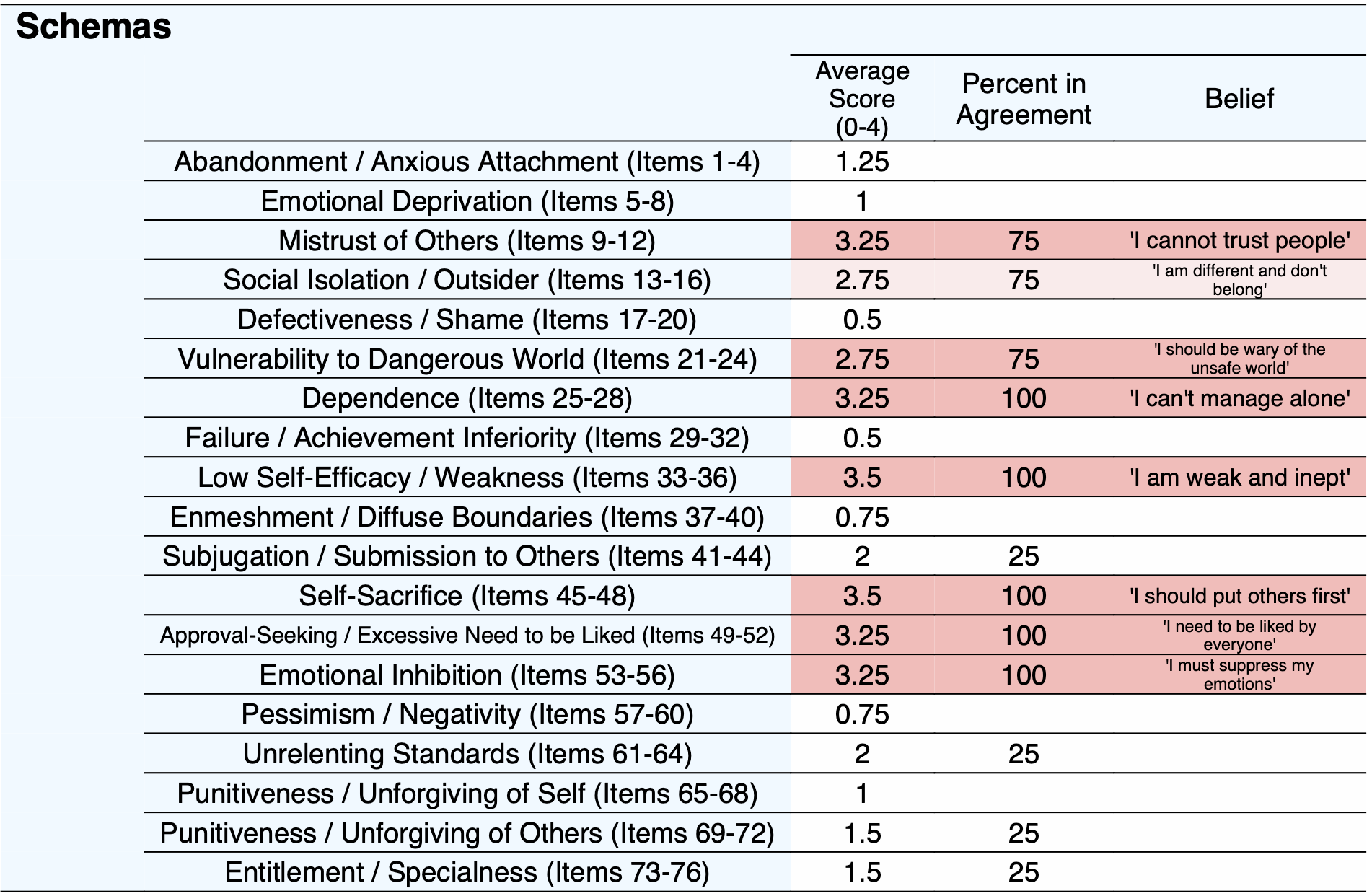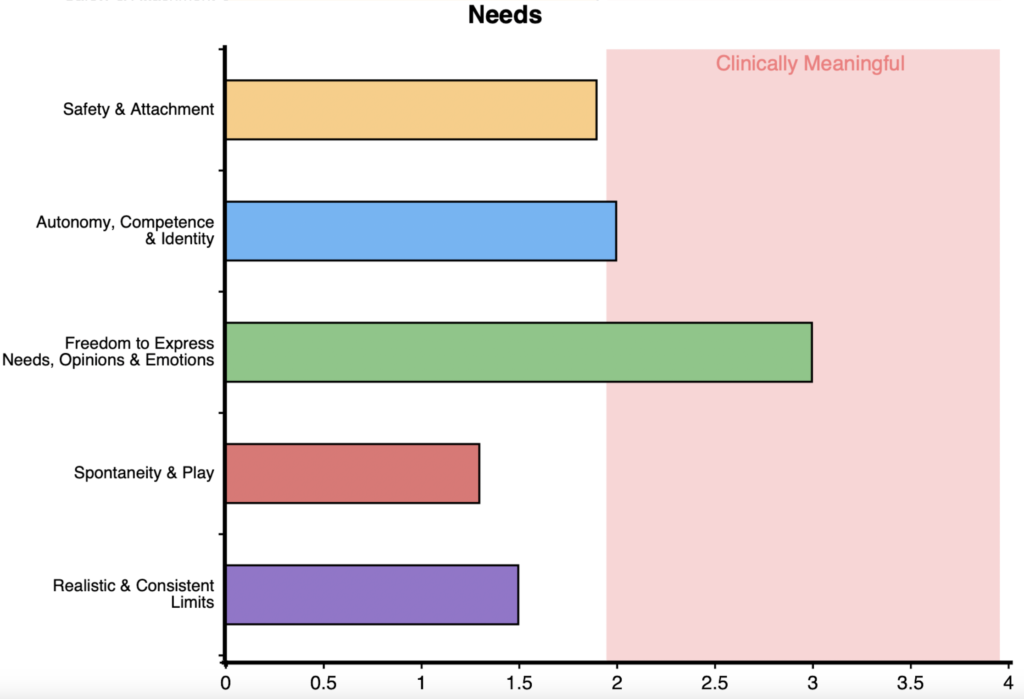The Maladaptive Schema Scale – Young Schema Aligned (MSS-YSQ) assesses maladaptive patterns of thoughts, behaviours and emotions. The MSS-YSQ is aligned with the the schemas defined in the Young Schema Questionnaire (YSQ) in 1990, but is shorter (76 questions) and uses contemporary psychometric techniques.
The MSS-YSQ consists of 19 schemas drawn from the full Maladaptive Schema Scale that are theoretically aligned with schemas defined by Jeffery Young (1990). The scale is designed to assess problematic schemas in clinical populations and inform case conceptualisations for adults experiencing a range of mental health problems, particularly those with complex issues such as personality pathology, interpersonal difficulties, post traumatic stress disorder (PTSD) or a history of abuse.
NovoPsych has developed and released the MSS-YSQ to facilitate ease of use for clinicians already familiar with interpreting the YSQ and integrating the results into their schema therapy practice. The MSS-YSQ in significantly shorter than the original YSQ while retaining scale reliability. The full MSS, which integrates additional schemas grounded in contemporary research, can be found here.
The MSS-YSQ is open source, meaning it can be copied and used clinically or in research without explicit permission, overcoming a limiting factor of the YSQ and derivatives.
Though the MSS-YSQ is a transdiagnostic tool, maladaptive schemas have been shown to have important associations with many mental health diagnoses, including PTSD, borderline personality disorder, dissociative disorders, depression and anxiety (Bär et al., 2023).
In clinical settings, the MSS-YSQ is used to identify which schemas are contributing to a person’s emotional or interpersonal difficulties. Understanding one’s schemas is instrumental in schema therapy, where the therapeutic focus involves helping clients to:
The MSS-YSQ measures 19 maladaptive schemas:
* Replacement of Insufficient Self-Control with Low Self Efficacy / Weakness
A schema present in the YSQ that was not included in the MSS is Insufficient Self Control, due to a conflation with symptoms of attention deficit hyperactivity disorder (ADHD). In particular, the YSQ items for this schema are closely aligned with issues faced by people with ADHD. Empirical research has shown that this schema is higher among those with ADHD (Kiraz & Sertçelik 2021; Thiessen, 2019), and upon review, it was decided that excluding it was prudent given the potential for misattributing difficulties to schemas, rather than executive functioning challenges grounded in developmental differences. While schemas have a large amount of explanatory power for some aspects of psychopathology, it is always prudent to consider the limited scope of a theoretical framework, to prevent it from being over-applied in unhelpful ways.
Self-efficacy shares conceptual similarities with the YSQ Insufficient Self-Control schema, but emphasises the learnt belief system underpinning the difficulties with self-control and frustration tolerance described in the latter.
Full descriptions of the schemas can be found in the below PDF.
Scores for the 19 subscales are presented as an average score, where the number represents the level of agreement with the schema, as defined by the Likert scale:
Strongly Disagree = 0
Disagree = 1
Neutral = 2
Agree = 3
Strongly Agree = 4
Higher scores are indicative of stronger agreement with maladaptive schemas and are hypothesised to be associated with psychopathology and more dysfunctional relational, emotional or personal functioning.

A schema is considered to be moderate when an average score is 2.5 or more, while the schema is considered to be strong and of clinical significance when higher than the 90th percentile. Scores on the 90th percentile or higher indicate that the respondent scored in the top 10% compared with other patients receiving mental health care. The 90th percentile threshold varies across schemas between an average score of 2.75 (e.g Dependence) to 3.25 (e.g. Mistrust). A higher threshold for “strong” indicates that there is a higher prevalence of a “moderate” schema among mental health clients.
A strong schema represents broad agreement with the schemas that are of theoretical importance to schema therapy in addition to a score that deviates from typical patterns of responding.
Maladaptive Schemas with Strong Agreement / Percentage in Agreement
Scores are also presented as the percentage of responses where the client “Agreed” or “Strongly Agreed” with the items in the subscale, producing a “Percent in Agreement” metric.

Childhood Unmet Needs Schema Clusters

In addition, scores are presented for each of the six early childhood needs. High scores on a need cluster strongly suggest that the cause of the schema is rooted in early childhood experiences. Scores of 2 or above are considered clinically meaningful and are suggestive of a childhood need that was chronically disrupted.
Safety & Attachment
Autonomy & Competence
Freedom to Express Needs, Opinions & Emotions
Spontaneity & Play
Realistic & Consistent Limits

The MSS-YSQ consists of schemas drawn from the MSS. The MSS was developed in 2024, through a rigorous and systematic process of iterative improvements using Modern Test Theory techniques (Rasch Analysis) to ensure its reliability and validity.
Details on the development and validation of the MSSv1.4 and by extension, the MSS-YSQ can be found in the MSSv1.4 Manual.
Table 4 on page 29 of the MSSv1.4 Manual compares the psychometric properties of the MSS-YSQ and YSQ-R.
Buchanan, B., Bartholomew, E., Smyth, C., & Hegarty, D. (2024). The Maladaptive Schema Scale – Young Schema Aligned.
Buchanan, B., Bartholomew, E., Smyth, C., & Hegarty, D. (2024). A comprehensive questionnaire for schemas related to psychopathology: The Maladaptive Schema Scale – Version 1.4 (MSSv1.4). https://doi.org/10.17605/OSF.IO/C3UPR
Bär, A., Bär, H. E., Rijkeboer, M. M., & Lobbestael, J. (2023). Early Maladaptive Schemas and Schema Modes in clinical disorders: A systematic review. Psychology and Psychotherapy, 96(3), 716-747. https://doi.org/10.1111/papt.12465
Kiraz, S., & Sertçelik, S. (2021). Adult attention deficit hyperactivity disorder and early maladaptive schemas. Clinical Psychology & Psychotherapy, 28(5), 1055-1064.
Thiessen, C. N. (2019). ADHD Symptoms, Maladaptive Schemas, and Dysfunctional Automatic Thoughts: Exploring Theorized Relationships in Emerging Adults (Master’s thesis, Ohio University).
Yalcin, O., Marais, I., Lee, C., & Correia, H. (2022). Revisions to the Young Schema Questionnaire using Rasch analysis: The YSQ-R. Australian Psychologist, 57(1), 8-20. https://doi.org/10.1080/00050067.2021.1979885
Young, J. E. (Ed.). (1990). Cognitive therapy for personality disorders: A schema–focused approach. Professional Resource Press.
Young, J. E., Klosko, J. S., & Weishaar, M. E. (2003). Schema therapy: A practitioner’s guide. Guilford Press.
Young, J.E. (2014). List of Early Maladaptive Schemas (2nd ed.). Retrieved from https://www.schematherapy.org/inventories-as-ebooks
NovoPsych’s mission is to help mental health services use psychometric science to improve client outcomes.
© 2023 Copyright – NovoPsych – All rights reserved